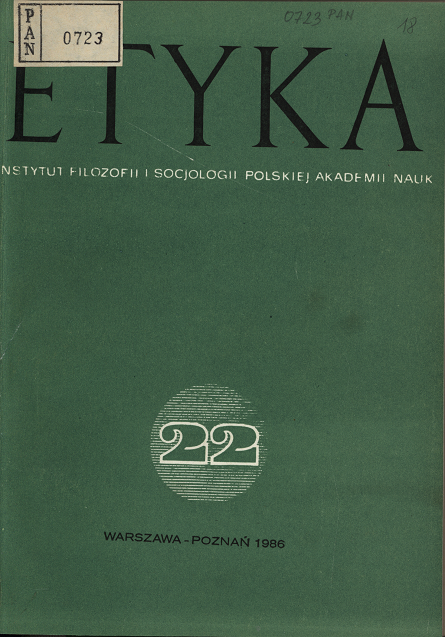Wyzwanie etnometodologii i nauka o normach
Abstrakt
By levelling its criticism it traditional sociology ethnomethodology focuses directly or indirectly on the role of norms in description and explanation of human behaviour. Although sociologists respond to this criticism the way in which they accommodate it is rather superficial. That is why this article is written in the form of a dialogue. One protagonist quotes selected tenets of ethnomethodology, phrasing them as he would be apt to in the programmatic phase of the development of that discipline, while the other offers corrections and undertakes to analyse and evaluate the views that he hears. In the course of their discussion it becomes clear that, according to ethnomethodology, norms out of context have no bearing on behaviour which is always occasioned by particular circumstances hic et nunc. Yet, it would not be true to say that remembrance of norms never affects decisions responsible for individual behaviour, any more than it would be to say that ethnomethodology can dispense with objective language as allegedly incompatible with the very nature of social life. Additionally, the dichotomy ‘indexical versus objective language’ distorts the continuum of the contextuality of expressions beyond recognition. Thus we are left with the old problem, familiar to both practitioners and theorists of normative disciplines, the problem of interpretation, its ramifications are neglected by ethnometodologists. Application of a concrete norm to a concrete situation presupposes an interpretation of the situation, and in this sense, it is true that knowledge of norms is not sufficient for a description of the behaviour by a man who follows them. But a norm can play a role in the interpretation of a situation too. Besides, in their attempt to get rid of surface norms, ethnomethodologists create latent or interpretative norms whose ontological status is rather doubtful. Though they are reconstructed they need not be Identified with deep-structure norms which in fact have influence on human behaviour. In case when the two might conflict the ethnometodologists would be hard put to know what to say. But without precluding any answer to this query, it must be stressed that the interpretative procedures, as they have been reconstructed from ethnomethodological analyses, are vague and underdeveloped which is probably due to this vagueness of criteria with which ethnomethodology defines the object of its interests.Pobrania
Opublikowane
Numer
Dział
Licencja
Prace publikowane w czasopiśmie ETYKA udostępniane są na podstawie licencji Creative Commons Attribution No Derivatives 4.0 International (CC BY-ND), tj. uznanie autorstwa-Bez utworów zależnych. Oznacza to, że Autorki i Autorzy zachowują autorskie prawa majątkowe do utworów i wyrażają zgodę, aby ich prace były zgodnie z prawem ponownie wykorzystywane do dowolnych celów, także komercyjnych, za wyjątkiem tworzenia utworów zależnych (dzieł pochodnych), bez konieczności uzyskania uprzedniej zgody ze Autora lub wydawcy. Artykuły mogą być pobierane, drukowane, powielane i rozpowszechniane z zastrzeżeniem konieczności poprawnego oznaczenia autorstwa oraz oryginalnego miejsca publikacji. Autorzy zachowują prawa autorskie do wspomnianych utworów bez innych ograniczeń.



